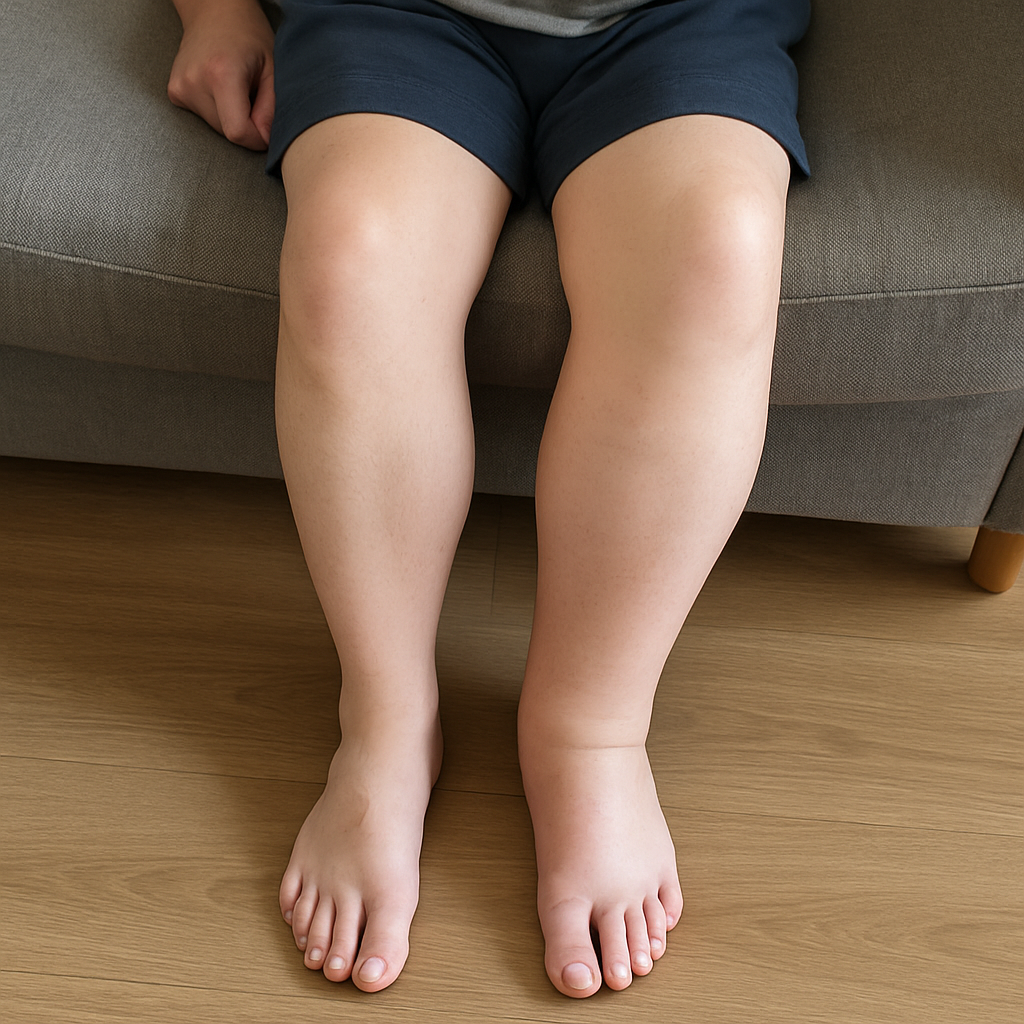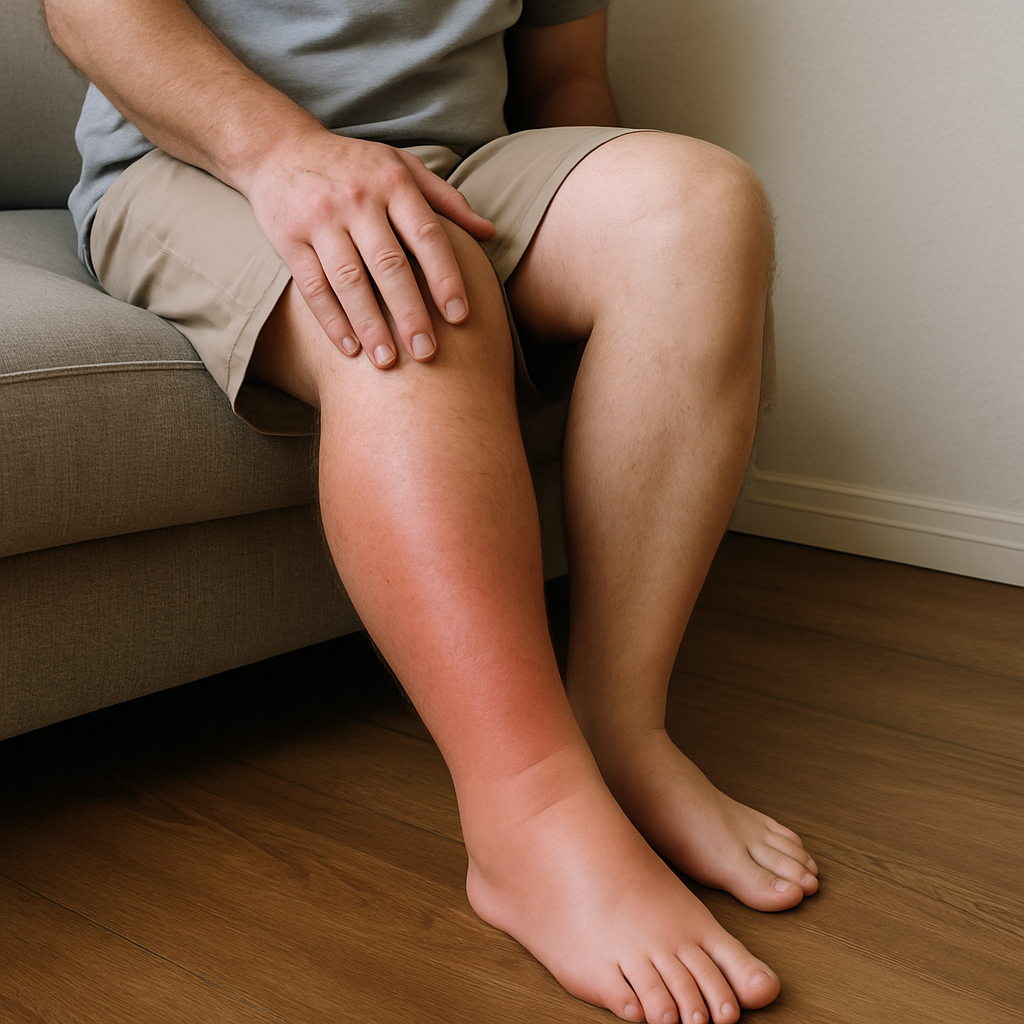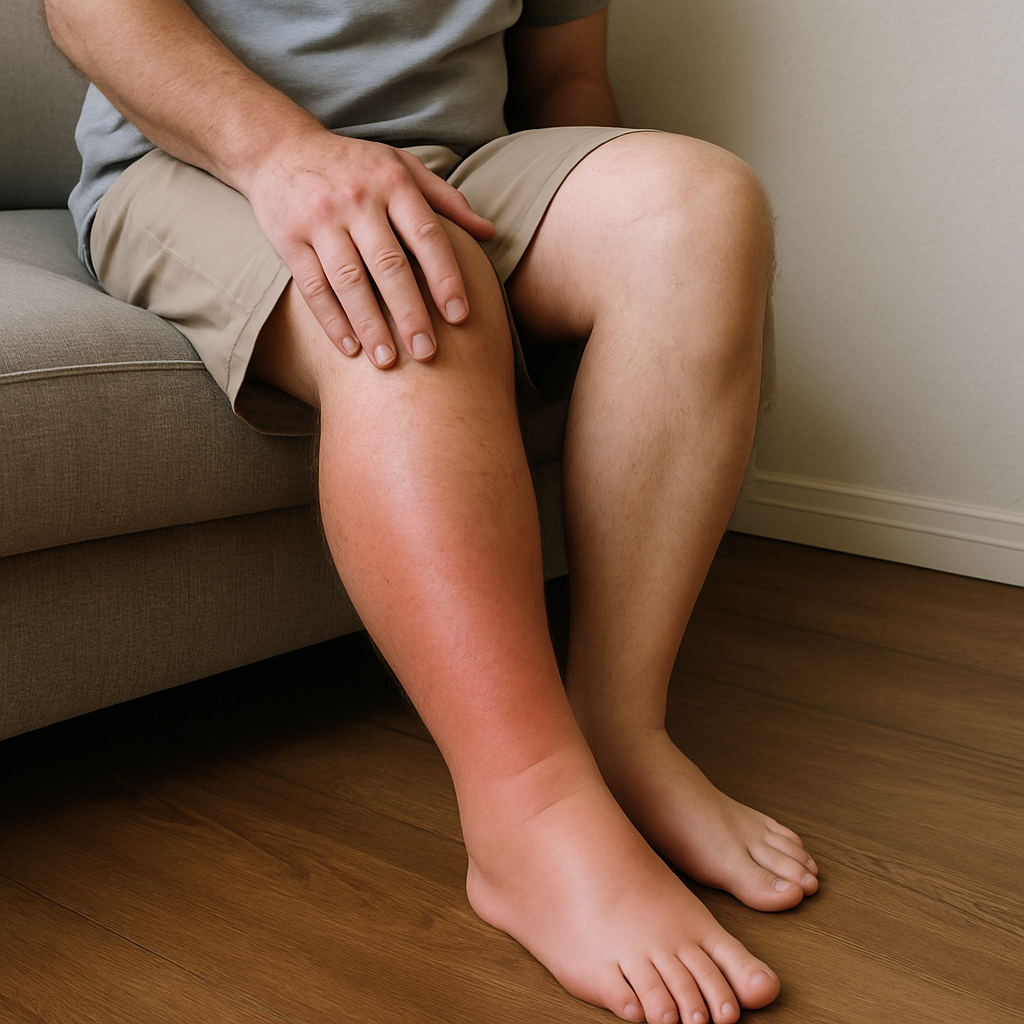Ask Ayurvedic doctor a question and get a consultation online on the problem of your concern in a free or paid mode. More than 2,000 experienced doctors work and wait for your questions on our site and help users to solve their health problems every day.
Why Is Only My Left Leg Swelling: Ayurvedic Explanation and Natural Remedies

Let’s just say it — swelling in just one leg, especially the left leg, is weird. Unsettling, even. Why is only my left leg swelling? Why not both? Why now? Why the left? These are the kinds of questions that can nag at you, especially if it’s not going away.
Swelling in the left leg only, whether it’s the whole limb or just the left lower leg swelling below the knee, can feel oddly specific. Maybe it’s just a little puffiness around the ankle. Or maybe your left leg swelling and pain shows up suddenly, making it hard to walk or even wear shoes. And when you Google it — yeah, you get a mixed bag of scary and vague results. So let’s zoom out and look at this through the Ayurvedic lens, which approaches the body not as parts, but as a whole, flowing system of energy, elements, and imbalance.
What Does Left Leg Swelling Mean in Ayurveda
Ayurveda doesn’t just ask what’s swollen — it asks why the swelling is happening where it is. Your left leg swelling isn’t just a localized issue; it’s a signal. A whisper (or maybe a shout) from your body that something’s out of rhythm.
The Role of Vyana Vata and Circulatory Stagnation
In Ayurvedic terms, circulation — blood, lymph, energy, even thoughts — is governed by Vyana Vata. It’s a sub-dosha of Vata, responsible for the movement of nutrients and fluids throughout the body. When Vyana Vata gets disrupted, things slow down. Swelling can result from this stagnation, especially in the extremities like the legs and feet.
Left leg swelling, or more specifically, swelling in the left leg and foot, might indicate Vyana Vata isn’t doing its job properly — not circulating, not moving, not clearing. And here’s where it gets more layered: why only one side?
Why Unilateral Symptoms Reflect Deeper Imbalances
Here’s a thought: in Ayurveda, left-side symptoms often relate to the lunar energy in the body — the Ida nadi, which governs cooling, feminine, introspective qualities. When there’s unilateral leg swelling — especially left leg swelling only — it might signal a blocked Ida channel or an underlying emotional weight (grief, stuck sadness, even over-nurturing behaviors). Sounds out there? Maybe. But Ayurveda often draws connections between emotional states and physical symptoms. Something to reflect on.
Energetic Channels (Srotas) and Blockages in the Left Side
The body’s energy network — called srotas — carries everything from blood to prana (life force). A blockage in a left-sided srotas could lead to stagnation manifesting as swelling in the left leg. Injury, chronic stress, unresolved emotions, even dietary choices can create ama (toxins) that clog up these channels. Picture a dammed river — the water has nowhere to go, so it pools. That’s swelling.
But remember: Ayurveda doesn’t work in silos. It's not just about where the swelling is, but what the pattern says about your lifestyle, mindset, and physical habits. And it’s not just theory — the next section dives into actual, everyday causes.

Don't wait or self medicate. Start chat with Doctor NOW
Why Is Only My Left Leg Swelling? Localized Causes and Triggers
So you’ve got swelling in your left leg only. Not the right. Not both. Just the left. That alone rules out a bunch of conditions like general fluid retention or full-body inflammation. But still — what gives?
Swelling in Left Leg Only vs Bilateral Inflammation
Let’s draw a line here. When both legs swell up, you’re often looking at a systemic issue: maybe kidney function, liver trouble, heart failure, or overall water retention. But unilateral leg swelling — especially when it’s just the left leg — points to something else. It’s more specific, more localized. It could be mechanical, circulatory, or even postural.
Swelling in the left leg only is often linked to things like blood flow obstruction, nerve compression, or even one-sided lymphatic drainage problems. Ayurveda would also point out that certain patterns of lifestyle strain — like always crossing one leg over the other, or sleeping on one side — might be tipping the energetic balance.
Oh, and side note: it’s not always serious, but it’s definitely always a message. Your body doesn’t just puff up for no reason.
Positional Strain, Injury, or Structural Compression
Let’s say you sit a lot. And maybe when you do, you cross your left leg over the right. Or you have a job where you stand all day, and your weight leans subtly more onto the left side. Or you recently twisted your ankle but didn’t think much of it. That kind of asymmetrical strain builds up over time.
Here’s where Ayurveda gets really practical. It doesn’t just ask “what’s injured?” It asks “how are you using your body every day?” So if your left leg swelling and pain shows up after long hours on your feet or a bad chair setup — it’s a sign of postural ama building up.
And let’s not forget veins. Varicose veins love to show up in the lower half of the body, and they’re often one-sided at first. Blood pools. Pressure builds. Swelling follows.
Swelling in Left Leg and Foot Due to Lifestyle or Posture
Honestly, we underestimate how much posture and movement affect our health. Sitting in a way that compresses the left hip or groin area can reduce lymph flow. Wearing shoes with uneven soles can subtly shift your gait. Even something like favoring one leg while climbing stairs or holding a child on one hip can throw your alignment off.
From an Ayurvedic perspective, this kind of chronic micro-strain affects rasa dhatu (the plasma/lymphatic tissue) and rakta vaha srotas (the blood-carrying channels). Over time, congestion sets in — and boom: swelling in left leg and foot.
Point is, don’t ignore these small patterns. They matter. A lot.

Left Leg Swelling and Pain: Deeper Signs to Watch
When swelling shows up with pain — not just puffiness, but a dull ache or even a sharp twinge — your body is raising the volume on whatever it's trying to tell you. Left leg pain and swelling together? That's not random. In Ayurveda, pain indicates an active doshic imbalance, often involving Vata or Kapha, depending on whether it's sharp and dry or heavy and sluggish.
Left Leg Swelling and Heart Connection in Ayurveda
Here’s where it gets interesting — and a little sobering. Ayurveda has long emphasized the heart (hridaya marma) as the seat of consciousness and circulation. If you're experiencing left leg swelling heart failure–related symptoms, like persistent puffiness below the knee, fatigue, or shortness of breath, Western and Ayurvedic medicine agree: don’t ignore it.
Heart failure and left leg swelling below the knee can be linked through congestive backup — a literal pooling of fluid when the heart can't pump efficiently. Ayurveda frames this as Vyana Vata failing to support Sadhaka Pitta (the energy that fuels the heart’s action), leading to stagnation, particularly on the body's left side.
This doesn't mean every instance of left lower leg swelling is heart failure. But if you’re seeing other symptoms stack up — tightness, breathlessness, fatigue — it's worth checking in with both a cardiologist and an Ayurvedic practitioner. Better safe than sorry, right?
Left Lower Leg Swelling Below Knee and Circulation Issues
When swelling is localized below the knee, especially in just one leg, Ayurveda would likely point to a blockage in the rakta vaha srotas (blood channels). This might be due to ama (toxins), poor circulation, a sedentary lifestyle, or even excessive cooling foods that dampen digestive fire.
Add to that structural compression from old injuries or varicosity, and the lower leg becomes a kind of reservoir for unprocessed stress, both physical and emotional. If the body can’t move things upward and outward, it leaves them in the least resistant place — often the legs.

Ayurvedic Treatment for Left Leg Swelling and Pain
So what do you actually do about it? Here’s the part that doesn’t require magic or mystery — just consistency and curiosity.
Herbal Oils, Compresses, and Massage Techniques
Start with abhyanga — warm oil massage — using oils like Mahanarayan or Dashamoola if pain is dominant, or Manjistha and Castor oil if stagnation and puffiness are the issue. Always massage toward the heart, and follow with warm compresses using ginger, turmeric, or salt packs. Sounds simple, but the results can be surprisingly potent.
Best Diet to Reduce Water Retention and Ama
Cut out heavy, processed, salty foods. Increase bitter and pungent tastes. Sip cumin-coriander-fennel tea throughout the day. Focus on warm, cooked meals that support Agni (digestive fire), and ditch ice-cold drinks — they suppress your body's ability to move things properly.
Movement, Elevation, and Breath Practices to Improve Flow
Gentle yoga, especially Viparita Karani (legs up the wall pose), works wonders. Walking daily, deep breathing (pranayama), and simply elevating your legs at the end of the day all help support Vyana Vata and circulation. It’s boring advice. But it works.
Prevention and Daily Care for Unilateral Leg Swelling
Small routines matter more than heroic efforts. Watch your posture, avoid long periods of sitting or standing still, wear supportive footwear, and keep checking in with your left side — how it feels, how it moves, how it holds.
Listen. The body whispers before it shouts.
Conclusion
Left leg swelling — especially when it’s only on one side — is more than a nuisance. Whether it’s mild puffiness or persistent swelling with pain, it’s your body waving a little red flag. Ayurveda doesn’t treat it as a standalone symptom. It sees it as a clue. Something’s out of alignment — energetically, emotionally, structurally.
The good news? You don’t need an elaborate plan to start feeling better. Gentle massage, mindful eating, supportive movement — and maybe a little curiosity about what your body’s trying to tell you — go a long way. Be patient with it. Be kind to your left leg.
And if you're still unsure, talk to someone. A good Vaidya (Ayurvedic practitioner) can help you decode the signals, and sometimes, just having someone listen is the medicine.
FAQs
Will drinking water reduce leg swelling?
Yes — if dehydration is part of the problem. But water alone won’t fix swelling if it’s due to ama, circulation issues, or structural problems.
Do bananas help swollen feet?
They can — bananas are high in potassium, which helps balance sodium and reduce water retention. Just don’t go overboard, especially if you're Kapha-dominant.
How to reduce leg swelling due to kidney failure?
That’s serious territory. You need both Ayurvedic and allopathic support. Reducing salt, improving Agni, and managing stress can help — but see a specialist.
How to reduce leg swelling during pregnancy?
Gentle massage, warm water foot soaks, legs elevated when resting, and avoiding excess salt can all help. Pregnancy-safe herbs and Ayurvedic teas may support flow too.

